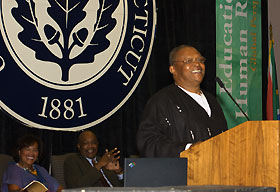|
This is an archived article.
For the latest news, go to the
Advance Homepage
For more archives, go to the Advance Archive/Search Page. | ||
|
Masekela Says Music Crucial Musicians have been in the vanguard of the quest for freedom, carrying the torch and leading songs of liberation, an internationally renowned jazz trumpeter, told students and faculty at the Rome Ballroom October 21.
Hugh Masekela, who has been called the father of African jazz and South Africa's musical ambassador to the world, explored the roles that musicians and other artists play in the struggle for human rights in Africa and around the world. His talk was part of the fourth annual Comparative Human Rights Conference, "Artists in the Cause of Human Rights," organized by the UNESCO Chair and Institute of Comparative Human Rights. Masekela also performed, along with the Thelonious Monk Institute of Jazz, at the Jorgensen Center for the Performing Arts in the evening. "It has always been the nature of the African people to celebrate the miraculous beauty of our continent through song and dance," Masekela said, "to sing the praises of our outstanding individuals in poetic verse and prose, to challenge our attackers and military foes with some of the most bewitching melodies. "It is no wonder that we lost all of sub-Saharan Africa to the invaders. The enemy," Masekela quipped, "never needed to determine our exact positions" because song and dance revealed the location. African songs "were about our God-given human right to be left alone so we could cherish the magnificence of our continent in an atmosphere of peace and tranquility," he said. Sadly, these appeals only served to exacerbate the level of greed with which our conquerors perceived us." The victims of colonialism were some of Africa's "greatest orators, poets, and musicians, whose songs, poetry, and oratorios were no match for the gun and the cannon, the dog, the tear gas, the poison, and the bomb," Masekela said. Africans paid a very high price for their freedom, he said. "We have paid that price by forfeiting almost all of our lands, herds and mineral riches, the very essence of our pride and self-esteem." Without that, he said, "it is difficult to effect a comprehensive revival, one which could be the backbone of our renaissance and, hopefully, a return to who we are." He said such a revival cannot take place "unless the environment that was destroyed through our conquest is reestablished and an atmosphere is redeveloped, where we can again sing the praises of our continent, having regained our pride, self-esteem, and glory." But this can't happen through summits and conferences, Masekela said: "Colonialism and racism invested billions in destroying our traditions and culture. The only way we can return to those of our roots that are still possible to rekindle ... can only happen through reinvestment in the original elements of our traditions and culture that we lost through conquest." The funds should come from "all the countries that benefit from Africa's wealth, and the wars they manipulate on our continent," he said. "If they really want to stop the wars in Africa, why don't they stop selling us arms?" Masekela said once the struggle has been won, the very people who fought for freedom often disappear into the "elite ranks of government, administration, and new opportunities, turning against the very circumstances that helped bring them to power." "We need to keep the leadership singing the songs of freedom, not of dictatorship, war, and tyranny," he said. "If we can achieve this mammoth quest," he added, "the future of human rights will be illuminated to such a level of sparkle as to render their destruction impossible." |

